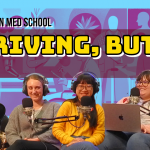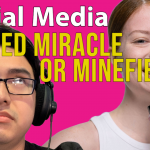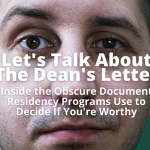Podcast: Play in new window | Download (Duration: 1:11:27 — 98.2MB)
Subscribe: Spotify | RSS | More
We on The Short Coat Podcast like to encourage people to follow their med school dreams in spite of whatever apparent obstacles stand in the way. So when we found out that Jessica McCabe, host of the popular YouTube channel How to ADHD, was coming to the University of Iowa, we were excited to get her on the show. And with co-hosts Irene Morcuende and LA–both successful medical students and ADHD brains–on hand along with CCOM learning specialist Chia-Wen Moon to prove that this obstacle can be just another bump in the road. You may be surprised to hear how those with ADHD brains–and the groups they work in–can actually benefit from their atypical thought processes.
But what kinds of effects does ADHD have in med school? What techniques have worked for LA, Jessica, and Irene? How do relationships suffer and flourish when one of you has ADHD? What does a learning specialist do? And how can medical schools support its students who need help? All questions we discuss for you, Short Coats!
Buy Our Merch and Give At The Same Time
We Want to Hear From You
Do you have ADHD? What about a learning disability? What are you struggling with, and who or what has helped you? Call us at 347-SHORTCT anytime, or email theshortcoats@gmail.com.






I’m an M1 with ADD and staying focused has always been a challenge. For most of school, I had trouble staying focused, but over the years in undergrad and grad school, I’ve figured out ways and incorporated ways from other places to control my symptoms.
I actually don’t take medication for ADD and haven’t taken medications for a long time and in a way, I feel that being able to manage the symptoms on my own is rewarding . It would be interesting to see if there are others in medicine who have ADD but don’t take medications for it.
I think the emphasis on systems is key, I’ve read Jame’s Clears book, Atomic Habits (as well as many other books on productivity) and having a good study system as well as good productivity habits is key.
One thing that I found out on my own is having an idea of what you want to get out of a particular study session and being able to visualize future study tasks being completed is really helpful. I really like using visualization and if things make sense in my mind, as a mental plan, not just something written on a calendar but something I can visualize, it’s easier to stay focused.